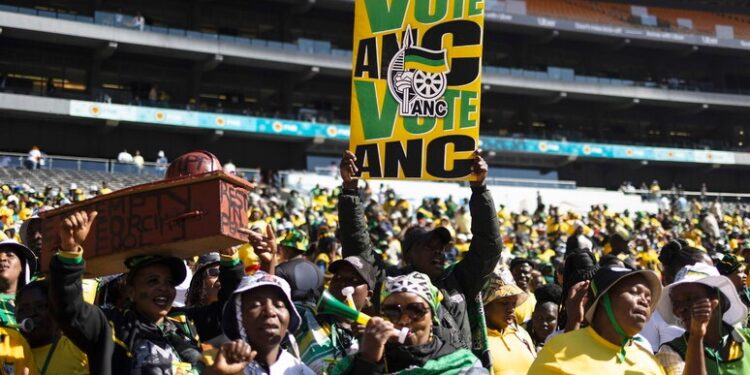In just four days, South Africans will head to the polls in what promises to be the most fiercely contested and unpredictable national election since the end of apartheid and the historic rise of Nelson Mandela 30 years ago. This election could mark a significant shift in the political landscape of the nation.
A recent survey by the Social Research Foundation (SRF) indicates a notable decline in support for the African National Congress (ANC), which has governed since the advent of democracy. Meanwhile, the main opposition party, the Democratic Alliance (DA), and a new political contender led by former President Jacob Zuma, uMkhonto weSizwe (MK), are showing gains in national support.
The DA’s increase in support appears to be widespread across the nation, while Zuma’s MK, a party often described as a “cult” due to its controversial positions, is seeing its support primarily in KwaZulu-Natal. This province, Zuma’s home turf, is characterized by a strong alignment with parties that advocate for the rights of the Zulu ethnic group, to which both Zuma and the provincial king, Misuzulu kaZwlethini, belong.
According to SRF’s May 22 poll, voter turnout is expected to be around 60%. The ANC is projected to receive 40.8% of the vote, a significant drop from previous elections. The DA is expected to capture 27.2%, and the nascent MK party could secure 13.3% of the vote. MK’s platform controversially includes the abolition of the rule of law, which resonates with some voters disillusioned by current governance issues.
With 52 parties vying for votes, the ballot paper is crowded, and voter indecision is high. This electoral uncertainty is compounded by widespread discontent with the current political situation, marked by economic challenges, corruption scandals, and service delivery failures.
The ANC, once revered for its role in the liberation struggle, now faces criticism for its handling of the economy and pervasive corruption. The party’s diminished support reflects a growing frustration among South Africans who are seeking change and accountability.
The DA, on the other hand, is positioning itself as a viable alternative to the ANC. It has gained traction with promises of clean governance, economic reforms, and better service delivery. However, its ability to secure a broader base across the diverse South African electorate remains to be fully tested.
Jacob Zuma’s MK party, though new and controversial, is leveraging Zuma’s enduring popularity in certain segments of the population, particularly in KwaZulu-Natal. Zuma’s supporters view him as a champion of their rights and interests, despite his contentious political history and legal troubles.
The predicted low voter turnout could play a crucial role in determining the election outcome. Low engagement often benefits parties with a dedicated base, such as the MK in KwaZulu-Natal, while parties with broader but less fervent support might struggle to mobilize their voters effectively.
The final days leading up to the election are crucial, as parties ramp up their campaigns to sway undecided voters. The outcome will not only determine the next government but also set the course for South Africa’s future, particularly in addressing the pressing issues of economic inequality, unemployment, and corruption.
As the nation approaches this pivotal election, the political atmosphere is charged with anticipation and uncertainty. The results will reveal whether the ANC can regain its footing or if South Africa is on the brink of a significant political shift. For millions of South Africans, the stakes are high, and the desire for meaningful change is palpable. The election could indeed be a turning point in the country’s democratic journey.














































